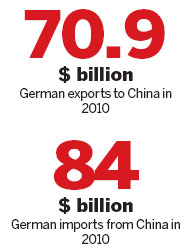Opinion
China, Germany good for each other in tough times
By Zhou Siyu (China Daily)
Updated: 2011-06-29 07:52
 |
Large Medium Small |
BEIJING - Bilateral trade and investment involving China and Germany will continue to rise as both governments strengthen their efforts to build better economic ties, said Sun Yongfu, director of the department of European affairs at the Ministry of Commerce.
|
 A worker assembles an electric car at a factory in Zouping, Shandong province. The factory exports new-energy cars to many countries, including Germany. [Dong Naide / For China Daily] |
A slew of contracts boosting bilateral trade and investment were expected to be signed between the two governments during Premier Wen Jiabao's visit to Germany on Monday and Tuesday. The contracts covered several sectors, including services, green technology, new-energy automobiles and chemical engineering, Sun said.
More cooperation will follow in sectors including logistics, finance, insurance and tourism, he added.

Trade and manufacturing are the pillars of the economies in both China and Germany and ties between the two countries have been beefed up to ward off the impact of the financial crisis.
China replaced the United States to become Germany's largest trading partner outside of the European Union in 2010 when bilateral trade surged by 34.4 percent year-on-year to $154.8 billion. Germany's exports to China jumped by 35.7 percent from 2009 to $70.9 billion in 2010 and its imports increased by 33.3 percent year-on-year to $84 billion, EU official data showed.
Trade has continued to grow this year. During the first two months, bilateral trade rose by 28.6 percent from the previous year to $27.5 billion.
Sun also said more and more Chinese companies have been investing in Germany in recent years, while China remained the most attractive investment destination for German companies.
"Bilateral investment has become a driving force that prompts better connections between China and Germany," he said.
Zhang Monan, a researcher in the economic forecast department at the State Information Center, said the enormous potential of the Chinese market will attract more and more investment from Germany.
"Because the country is poised to transform its economic growth mode to rely more on domestic consumption, it will become more attractive for German companies," she said.
Chinese companies can also benefit from German investment and take the opportunity to learn from Germany's advanced manufacturing technologies and its management expertise, she added.
"The know-how from an advanced manufacturer such as Germany will help Chinese companies improve both their management efficiency and quality of production," Zhang said. "This is what really matters in China's industrial upgrade."
Affected by debt woes in the euro zone, Chinese investments will also be needed in Germany, said Yao Lin, a European specialist at the Chinese Academy of International Trade and Economic Cooperation.
"There is great potential for more trade and economic cooperation between the two countries," she said.
| 分享按鈕 |